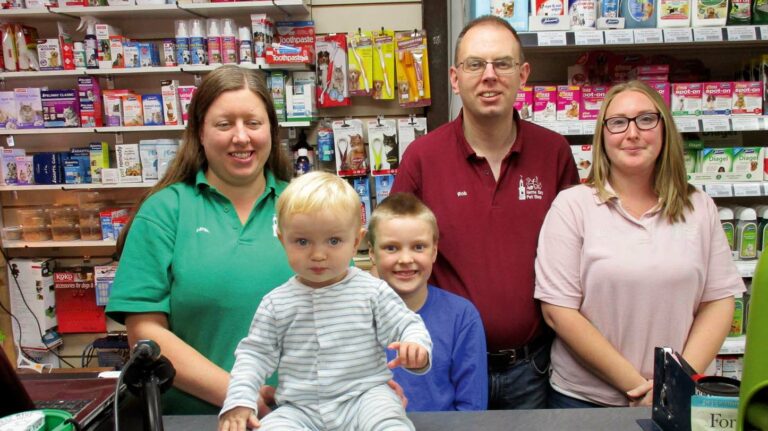Rob and Sarah with their two children, Bella and Ed. Ed likes helping out in the shop, and Bella likes exploring! Staff member Amy stands to the right
Within months of Herne Bay Pet Shop starting to sell hamsters and birds, the Animal Activities Licensing Regulations were announced. Owners Rob Page and Sarah Wyles faced a quandary because under the new rules, they would have to stop selling all bird species apart from finches…
Rob, Sarah and their two-and-a-half-year-old son, Ed, moved to Herne Bay, Kent, in 2013, but they soon realised the healthy work-life balance they longed for was not happening. Rob was leaving the home at 6.30am and not getting back until about 8pm, and Sarah was working the night shift as well as being a courier driver.
Something had to change and one possibility was starting their own business. Then a pet shop which has been around since the Sixties came up for sale as the previous owner wanted to retire due to ill health.
Sarah had grown up on a smallholding and had work experience in a vet’s practice, both had kept pets, and with Rob’s background in technology, sales and business, it presented the perfect opportunity to combine their skillset. Sarah has also worked in supermarkets for 13 years, so could draw on this experience.
There was also another huge advantage.
Sarah said: “We are home educating our children [little Bella has joined the family and is now a year old], so it is all about being flexible. We make our work fit around the family rather than the other way around.”
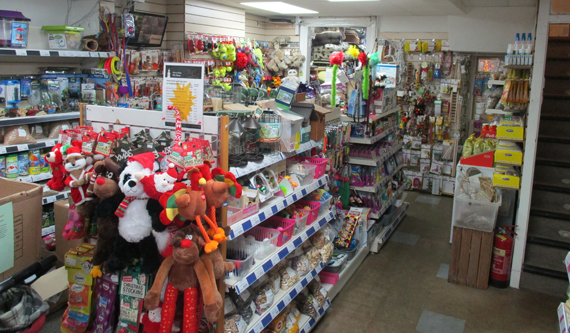
Some customers don’t realise there’s a further room at the back
They took over the store in February 2017 and, although the previous owner had sold animals, they decided not to follow this route and just focus on products. Sarah said: “That whole summer, we kept having people ask, ‘Do you not sell animals? Oh, I always got my budgie or hamster from here’. So it quickly became clear that we needed to sell birds and small furries such as gerbils and hamsters.”
Towards the end of 2017, they approached their local council and asked about the requirements for a pet shop licence and got it in spring 2018. Not long after, the Animal Activities Licensing Regulations were announced. Under the new rules, while they could carry on selling hamsters, they could only sell finches as the new cage size requirements excluded the other species they were offering.
DECISION TIME
Rob said: “It was a case of, oh, ok, what do we do with this? Do we stop selling animals completely? Do we only sell zebra finches and hamsters, or do we change what we have, the infrastructure? We looked at this, we looked at the figures, we asked a few of our customers, we asked around and we decided that it’s a USP to the business, so we decided to keep doing it.”
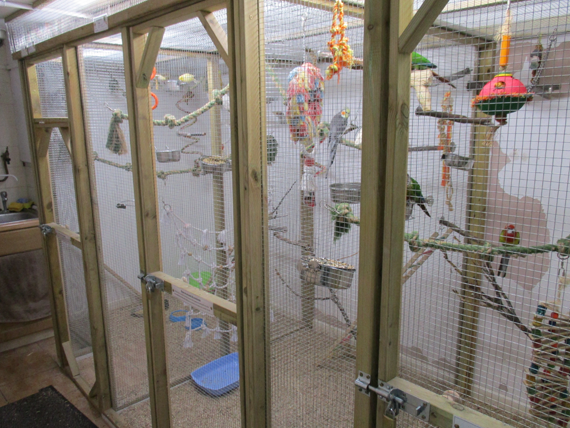
Aviary was custom-built with three flights to adhere to the October 2018 regulations
They decided to bite the bullet and convert a side room to an indoor aviary with three separate flights so they could stock more species including canaries, budgies, cockatiels and conures, depending on availability. They would also have a quarantine facility upstairs.
As luck would have it, one of their customers is not only a handyman but also breeds birds and, in early 2019, he spent a week building the new bird room, which includes avian-quality UVB lighting. All this was done after running their plans past the local council.
He said: “Obviously all of this came with a cost. But given that there are very few other pet shops in our area who sell animals, it gives us a USP and draws in customers. This was our main driving reason behind doing what we did.
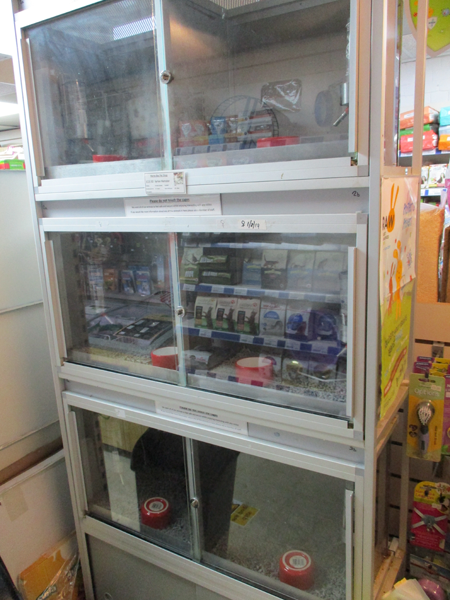
Hamster cage sizes were compliant with the regulations
Having carried out this work, we received many positive comments and praise from customers. In fact, when people walk into the room for the first time, their initial word is ‘wow’!”
The effort had paid off and the aviary has been refilled multiple times, with sales of budgies, finches, canaries and quails especially popular. Most are sourced from local breeders.
At inspection time, the store was awarded two stars because it has not held a licence for three years. He said: “The inspector did say that this will change as we get more years.”
The inspector was ‘very complimentary’, but left them with a list of staff training and appraisal, procedures and documentation to complete. Rob said: “We’ve been given no additional guidance about the depth or quality that they expect these to be completed to.
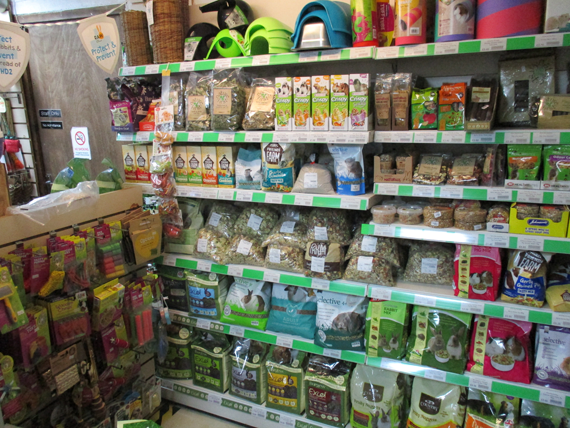
There is strong demand for small animal products
“We also have to do staff training and appraisals, but this is not just on animal care and husbandry as it includes things like first-aid. But shops who do not have a licence are not checked on this [items such as first-aid] and I don’t see the logic. I have to sit down with every staff member and run through everything, not just about animals, and yet that is something you can see everyday when they go about doing their job.
“Yes, you do need procedures in place, for example if a bird escapes, and it is also good if you have new staff. We do understand why the regulations were introduced. But they aren’t easy to implement or follow, for example the enclosure sizes with the percentage increases for multiple birds.
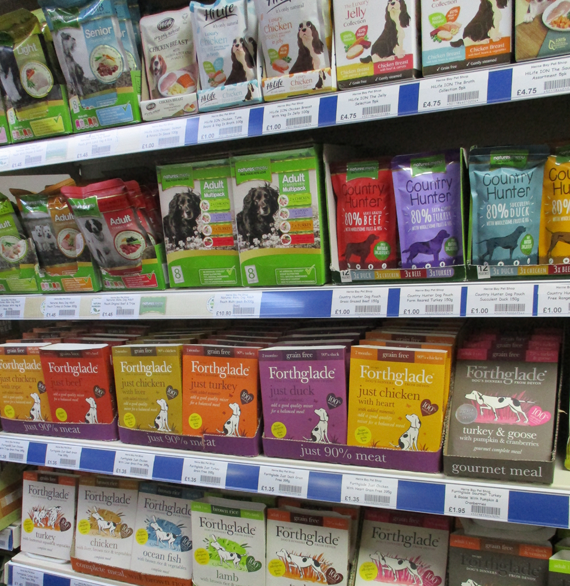
Natural momentum is evident with wet food range
“It’s also farcical when you consider that there is nothing regulating what our customers do with animals once they leave the shop. Yes, our birds are well cared for in a spacious environment, but what stops someone putting a pair of budgies in a small cage that offers no room for movement?
“It seems to us that it was rushed in without enough consultation from the people whom it affects the most – those of us who have a licence and must comply with it.”
STICKING TO PRINCIPLES
Right from the beginning, Rob and Sarah were determined to embed their philosophy, work ethic and practice into the business. He said: “Our ethos is about flexibility, friendliness and a warm welcome, being part of the community. It’s about being somewhere you can come and have a friendly response and talk to people with a knowledge base.”
He recalls a customer who wanted a harness and was very surprised to learn that she could bring her dog in to have it fitted as a Pets at Home store would not let her do that. “I told her, well, we do,” he said.
One of their early decisions was to not go down the route of supermarket discounts. Rob explained: “We could use the promotions from wholesalers to offer varying offers to our customers, but we choose not to. Instead, by using them to our advantage, eg. bulk buying key lines, we can keep our prices consistently low.”
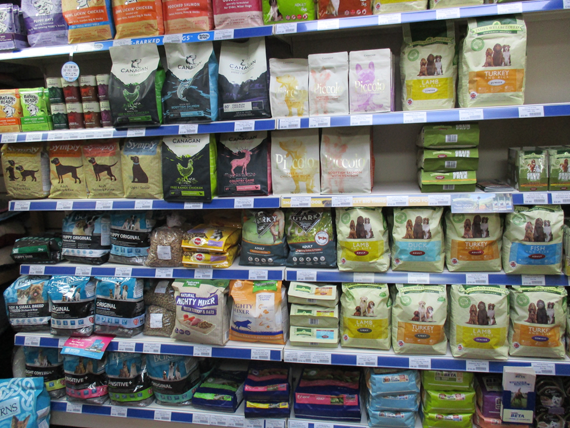
Smaller sized dog food packs sell better than bulk bags
“Take Felix. We know supermarkets will always have a promotion running, so people hunt for the discount at whichever supermarket is running it. We do not want to have changing goal posts. Besides, for our regular customers who buy the same product, if what they buy is one week £10.50 and the next £11, it throws their confidence.
For us, consistency and honesty are important.”
Herne Bay Pet Shop offers the Burns Pet Nutrition loyalty card scheme. “Our customers love it; they see something at the end, a reward,” he said.
The store does not offer its own loyalty scheme because in order to pay for it, this could mean increasing prices instore, which defeats the whole purpose as those not on the scheme would then not benefit. “This is also why we do not do own brand,” he said. “We could fill our shelves with own-brand, but if that customer goes on holiday, they either have to make sure they have enough or if they run out, they have the issue of changing the dog’s food. As such, we only stock well-known brands that are not in grocery, so if they go and visit family up north, they can find it in a pet store.”
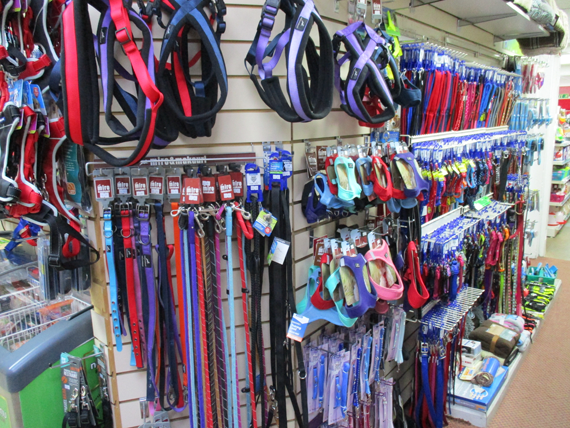
Independent brands like Miro and Makauri have a growing presence
Rob and Sarah also prefer to deal with independent suppliers such as Miro and Makauri. “They’ve only been around for 18 months or so and we brought in some of their harnesses and leads. They’ve become so popular that we are reducing a couple of other brands to make more space.
“I prefer supporting the independent. Often their ranges are so different, but it’s also about the support you get. The Canagan rep for example is brilliant. We rang her up with a problem – we received a wrong order – and it got sorted there and then and we got the right stuff the very next day. That’s what we want, it’s that support which, as an independent, you need.”
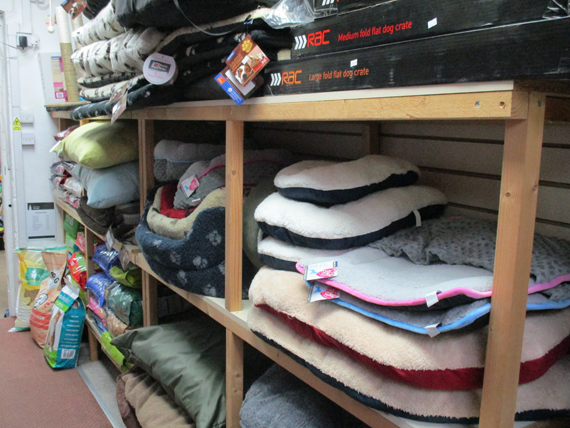
Nice selection of beds
He also remembered a customer who was going on holiday and came in at the last minute looking for two Miro and Makauri leads in a particular colour in which they had run out of stock. Rob called the owner, Scott Heinemann, who popped the leads in the post for next-day delivery. “There is none of this minimum order or certain quantities restrictions.”
Rob and Sarah offer a growing delivery service twice a week. While it started out being mostly cat litter, customers are now placing orders for items including bags of dog food and pet beds. With an eye on growing community ties, they have established links with a local dog groomer, a few dog walkers, an animal rescue and a pet photographer.
“We are really trying to be a one-stop shop for all pet owners,” said Sarah. “We describe ourselves as the Sainsbury’s for pets, and we cover all species.”
KNOW YOUR CUSTOMER
The first few months were spent getting to know their customers and observing shopping patterns and behaviour. They noticed that with dog toys, there seemed to be a cap on spending at about £5. “Customers will buy more of the premium toys at Christmas.” said Sarah. “Other times of the year they don’t sell as quickly.
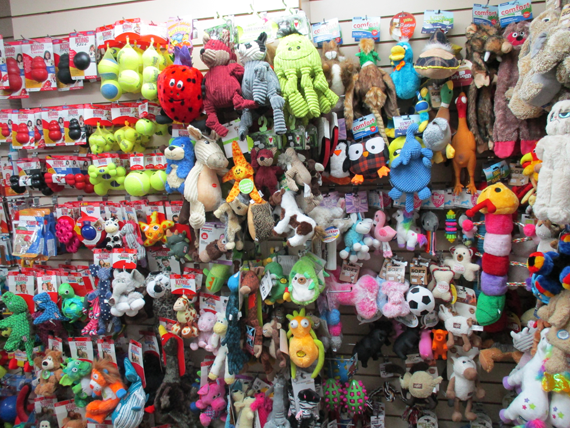
People don’t seem to want to spend more than £5 on toys, unless it’s Christmas!
“It’s funny, but people around here seem to spend more money on small animals than they do on dogs or cats. It’s like they feel they have to make their cages more interesting because they can take a dog out for a walk. They generally buy more things for the hamster or rabbit and pamper their hamsters and guinea pigs more than cats or dogs, which is why I try to get as many new lines as possible.”
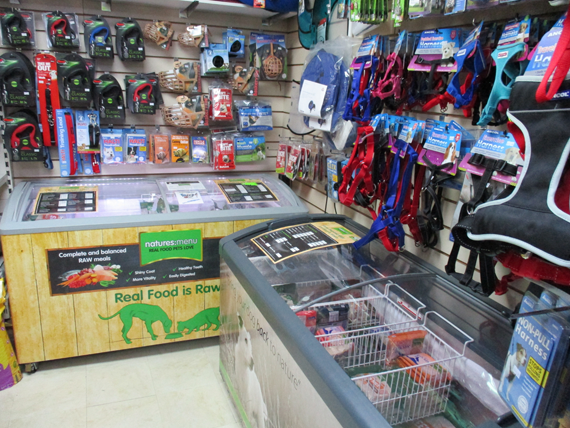
The two freezers for frozen raw are not enough, and there are additional stock freezers out back
As with many retailers, frozen raw is a strong seller and they now have two freezers in the shop and two in storage. Pick-and-mix treats is also popular and they’ve noticed that dog food sales are mostly the smaller bags.
“Our good sellers are Burns, James Wellbeloved and Canagan. But with James Wellbeloved we struggle because of online sellers where you can buy their larger sacks at prices close to what our wholesalers sell it for.
“I have spoken to our rep two to three times about this and, although he commiserates and sympathises, there is nothing he can do.
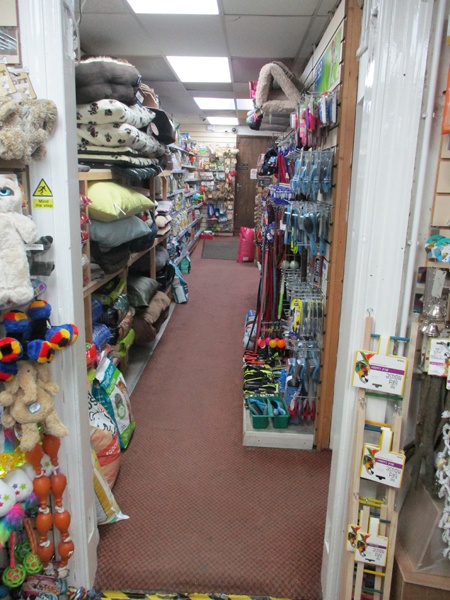
Shop is on the long side!
“Our customers ask why this is so, but it’s because it is a Recommended Retail Price and not a fixed price.
“I have four team members and bills to pay; I cannot order two tonnes and store the food, but these big online retailers can place huge orders and get the cracking deals.”
Rob and Sarah do however order a tonne of wild bird seed direct, on which they get good margins and then bag up themselves. Volume wise, wild bird seed is their big seller.

Bird seed is bought in by the pallet load and bagged up instore
But sometimes things can be a bit hit and miss. For example, when their wholesaler was offering a promotion on a particular brand of treats, they decided to give it a go and bought the whole range. Only two of the lines are selling well. “Some things work, some things don’t,” he said. “It is what it is.”
Rob and Sarah tend to get ideas for new products from sales reps, trade magazines, wholesaler catalogues and online research. Sometimes, it is a customer’s request that triggers a new listing.
“For example, one customer asked for a specific Burgess hay,” said Rob. “I brought it in and then decided to get another and put it onshelf to see what would happen. It sold the very same day. Now I bring in three at a time.”
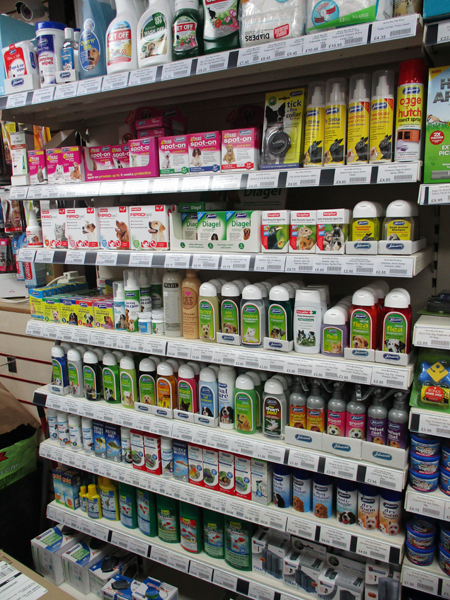
Healthcare section covers every need
Sarah adds: “It’s also about what not to sell. If customers ask for Bakers, we tell them they can get it in the Coop. It’s about trying to find things you cannot get elsewhere.”
LOOKING AHEAD
It’s almost unbelievable how a pet shop can be in the same location for more than 50 years and yet, even now, customers who live locally will walk in who had no idea the pet shop is there. Raising its profile is key, said Sarah, and its online presence is all about getting footfall instore.
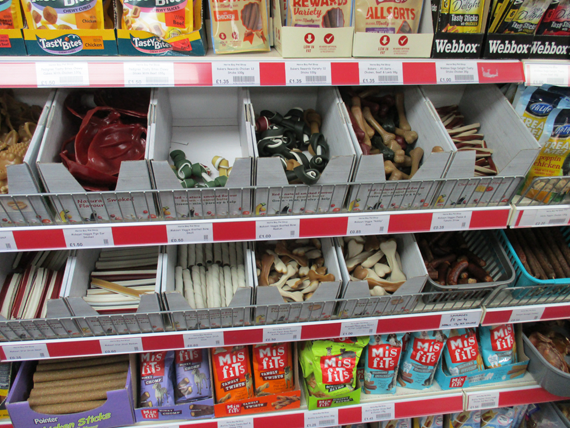
Customers do like pick-n-mix
Both also want to improve the signage in and out, and are applying to the council for a grant to help improve local businesses to facilitate this. “This is like a Tardis, people do not realise the shop extends and there’s a rear room; they think that’s the stock room,” said Rob. “We want to have signage directing people to the rear of the shop, saying something like, ‘More products this way’, as well as signs for dog and cat food.
“We also want to change the sign out front and the awning. Because it’s red in colour, for some reason it makes people think we are a newsagent. We have had people come in here asking for newspapers, cigarettes or drinks. So we are going to change that. But also, the wall outside still refers to rabbits and other animals that we don’t sell. We really want to rebrand.
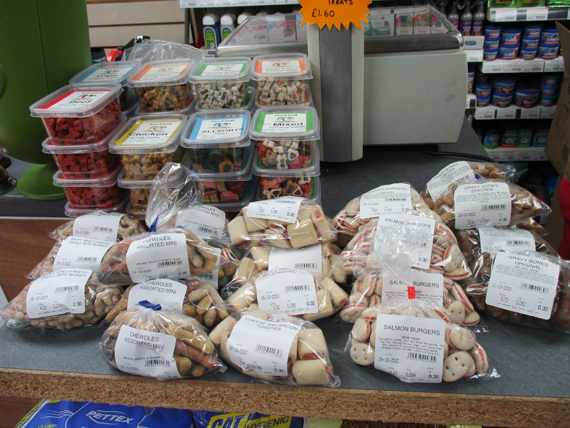
Counter display encourages impulse purchases
“You have to have plans. Having plans means you are not standing still. A business that stands still is not going to survive. It’s about adaptation and continuing the business. As an example, will click-and-collect work for us, or maybe click-and-deliver?
“We cannot compete with online retail, but it’s about adapting. We also want to be able to capture the new families on the new-build estates in Herne Bay.
“We’ve also changed our lighting from fluorescent to LED – something we did to reduce our energy usage and be more eco-friendly, and keep our overheads down as well as brighten up the shop interior. We’re also investigating how to reduce our single-use-plastics, but this is more of a medium to long-term goal!
“We are seeing second- and third-generation customers; they will say, ‘I used to come here as a child’. We want those children to keep coming back, and one day also with their families. We want to
remain friendly, welcoming and family orientated.
A pet shop has been here for 50 years, and we want that legacy to carry on.”
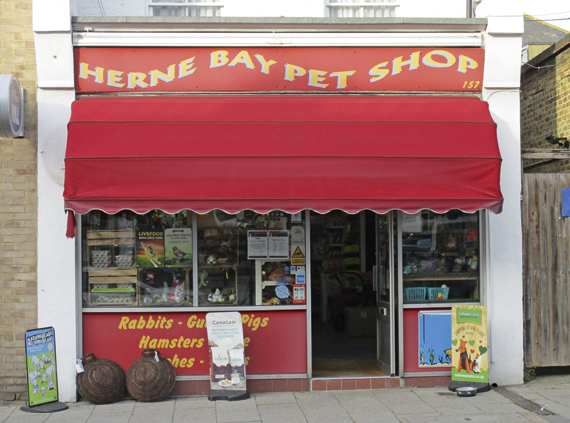
Front-No captions necessary


